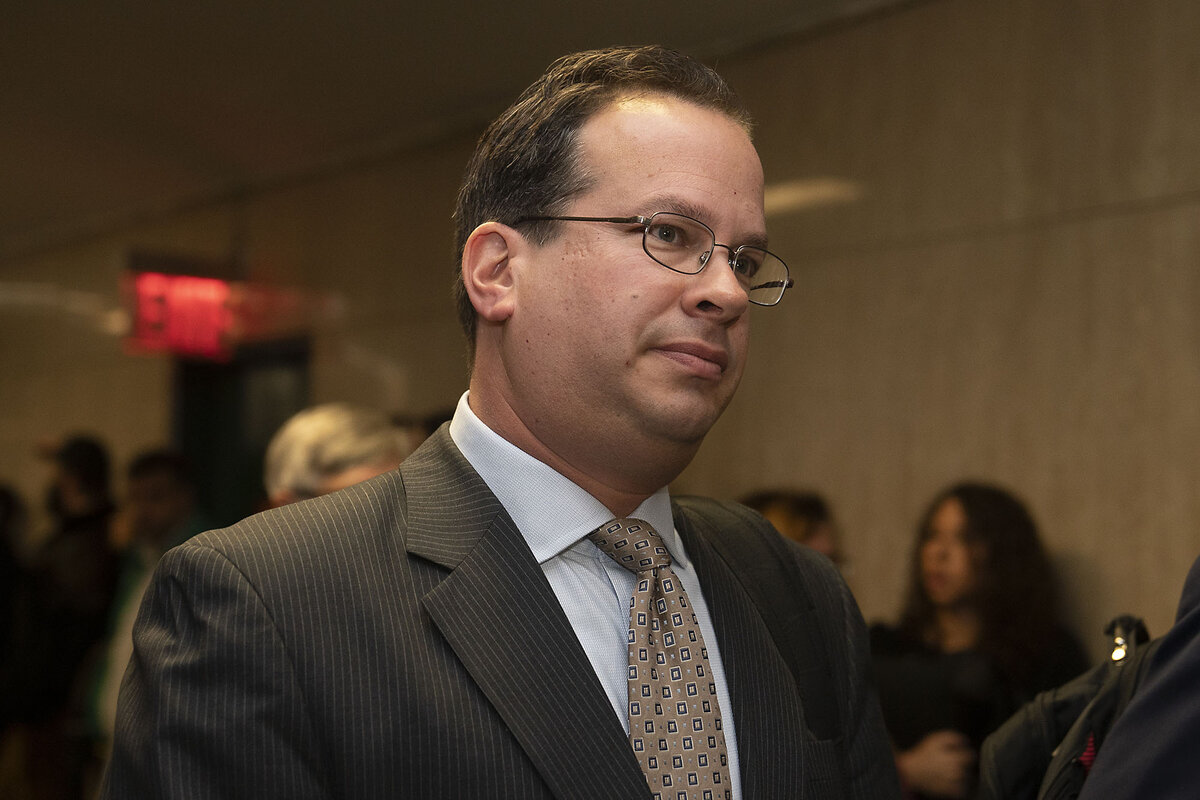The Trump trial heads to the jury – and a historic decision
Loading...
The first criminal trial of a former U.S. president has landed today in the hands of 12 New Yorkers.
The defense and prosecution laid out their closing arguments to the jury Tuesday in former President Donald Trump’s New York hush money case, which has gripped the media’s attention and kept the Republican presidential candidate in a courtroom for the past six weeks. Both sides spent an unusually long time summing up their cases – just under three hours for the defense and more than five hours for the prosecution – causing the jury to stay late, long past the courthouse’s 5 p.m. closing time.
Tuesday’s marathon arguments underscored the complexity of the case as well as its historic nature – and stakes. Regardless of the outcome, the trial will forever be an asterisk on Mr. Trump’s presidency and could influence both the next election and American politics for years to come.
Why We Wrote This
As the hush money case heads to the jury, it may be the least important criminal indictment against Donald Trump but likely the only one to come to trial before November.
“They wanted to leave nothing left to chance,” says Catherine Ross, a law professor at George Washington University and author of the book “A Right To Lie? Presidents, Other Liars, and the First Amendment.” “They know that whatever happens, what they did in this trial is going to be closely scrutinized by both sides.”
At the same time, it’s unclear whether this or any of the cases against Mr. Trump would actually change the shape of the race. FiveThirtyEight’s general election polling average shows no real change since the New York case began a month ago. Other polls suggest that a majority of voters haven’t been paying attention. Although the case centers on Mr. Trump allegedly directing his former lawyer Michael Cohen to pay porn star Stormy Daniels $130,000 to keep her from publicizing a claimed sexual encounter, the actual charges are about drier matters of bookkeeping and election law, and the path to a felony conviction is far from straightforward.
On Wednesday morning, Judge Juan Merchan gave the jurors instructions before they began deliberation, reminding them that they were making “a very important decision about another member of the community.” Mr. Trump had no duty to testify, he said, and did not need to prove his innocence. It is the prosecution that must prove its case beyond a reasonable doubt.
Mr. Trump, who is required to stay in the courthouse while the jury deliberates, seemed to be preparing for a possible conviction Wednesday. “Mother Teresa could not beat these charges,” he told reporters.
Hush money payments are not illegal. Instead, prosecutors charged Mr. Trump with 34 counts of felony falsification of business records, saying he orchestrated the payoff and deliberately mischaracterized Mr. Cohen’s repayments as “legal expenses” in order to prevent the situation from impacting his 2016 presidential campaign. Mr. Trump has denied the affair with Ms. Daniels as well as the prosecution’s other claims in this case and in the three other criminal cases pending against him.
Mr. Trump, who had professed himself eager to take the stand in his own defense, never did. Legal experts say the defense didn’t need to offer an alternative narrative; it simply needed to poke one or more holes in the prosecution’s case.
“I think of this as a Jenga game,” says Ms. Ross. “The defense needed to destabilize at least one of the building blocks of the prosecution’s case. ... They don’t have the burden to tell a story; they just have to make the structure fall.”
Much of the defense’s closing argument focused on one Jenga block in particular: Mr. Cohen, whom attorney Todd Blanche referred to as “an MVP of liars” and the “GLOAT” – greatest liar of all time. Mr. Cohen was the only witness able to establish that Mr. Trump knew of the hush money payments, but he has also been sentenced for felonies and and has a history of perjury. “He’s the human embodiment of reasonable doubt,” said Mr. Blanche when capping off his list of 10 reasons the jury should not convict his client.
Taking the podium after a lunch break Tuesday, the prosecution moved quickly to defend Mr. Cohen’s testimony. Prosecutor Joshua Steinglass conceded that Mr. Cohen, with his established history of theft and lying, isn’t necessarily whom they would have chosen at “the witness store,” but noted that he was chosen by Mr. Trump for jobs that “no one else wanted.”
“The prosecution often has to rely on witnesses with baggage because those are the ones with the inside scoop, those are the ones in the room where it happened,” says Cheryl Bader, a criminal law professor at Fordham Law School and former assistant U.S. attorney for the District of New Jersey. “The prosecution has to show why, in this instance, Cohen is telling the truth. ... The alternative is that Cohen paid [Ms. Daniels] out of the goodness of his heart, and that’s not a plausible narrative.”
The prosecution also reiterated in its closing arguments that it had provided evidence corroborating Mr. Cohen’s testimony. It showed the jury Sharpie-signed checks from Mr. Trump, invoices, call logs, and handwritten notes from Trump Organization officials about the payments to Mr Cohen.
“The defense said, ‘This is a paper case,’ as if that’s not a case,” says Ms. Ross, with a laugh. “You don’t normally have all these receipts.”
Editor’s note: This story has been updated with the judge’s instructions to the jury, and a comment by the defendant.







